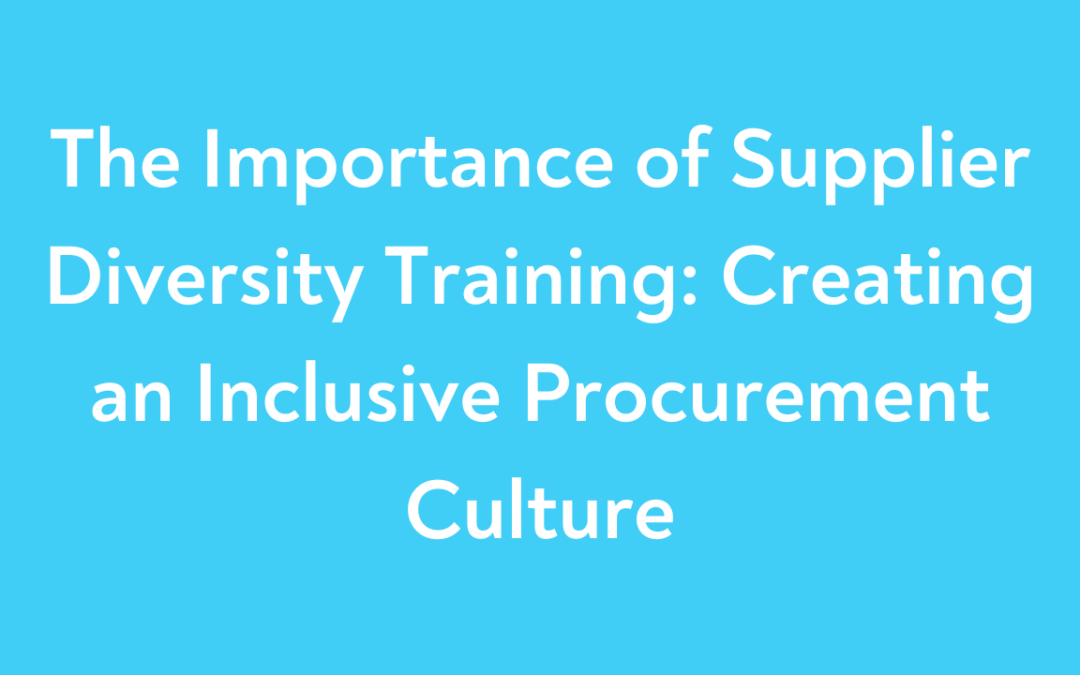Creating a diverse and inclusive procurement culture is a business strategy that fosters innovation and resilience in your corporation’s supply chain. When you facilitate inclusive practices in your procurement process, supplier diversity training becomes a powerful tool that can equip procurement professionals to develop a more diverse, agile, comprehensive, and effective supply chain.
Defining Supplier Diversity Training
Supplier diversity training is a specialized form of instruction that educates procurement professionals about the importance of supplier diversity, the benefits of engaging with diverse suppliers, and strategies to incorporate these suppliers into the organization’s supply chain. This training is crucial in breaking down biases, promoting a culture of inclusivity, and empowering procurement professionals to champion supplier diversity in their day-to-day work.
The Crucial Role of Supplier Diversity Training
Here’s why supplier diversity training is integral to creating an inclusive procurement culture:
- Raises Awareness: The first step towards creating an inclusive procurement culture is raising awareness about the value and importance of supplier diversity. Training helps educate procurement professionals about the economic, social, and business benefits of supplier diversity.
- Develops Skills: Supplier diversity training equips procurement professionals with the skills they need to identify, engage with, and manage relationships with diverse suppliers. These skills include understanding the nuances of supplier diversity programs, assessing the potential of diverse suppliers, and adapting procurement processes to be more inclusive.
- Challenges Biases: Training can be an effective way to challenge and counteract biases that may exist in the procurement process. It encourages procurement professionals to examine their own biases and rethink their procurement practices to be more inclusive and equitable.
- Drives Change: Supplier diversity training empowers procurement professionals to become agents of change within their organization. Equipped with knowledge and skills, they can drive the integration of diverse suppliers into the supply chain, fostering a culture of inclusivity and equity.
- Enhances Compliance: With many industries and governments implementing regulations around supplier diversity, training helps organizations maintain compliance with these requirements. Proper training provides procurement professionals with the knowledge to navigate these regulations effectively and efficiently.
The Path to Inclusive Procurement through Training
To effectively implement supplier diversity training and foster an inclusive procurement culture, consider the following steps:
- Leadership Commitment: Leadership plays a vital role in promoting supplier diversity. When leaders champion supplier diversity training, they signal the organization’s commitment to diversity and inclusion, encouraging procurement professionals to prioritize supplier diversity.
- Comprehensive Training Programs: Implement comprehensive supplier diversity training programs that cover the why and how of supplier diversity. These programs should raise awareness about the benefits of supplier diversity, provide practical skills for engaging with diverse suppliers, and encourage participants to become advocates for supplier diversity.
- Ongoing Learning Opportunities: Supplier diversity training should not be a one-time event. Regular refresher courses, workshops, and seminars can ensure that the importance of supplier diversity stays top of mind and the skills for engaging with diverse suppliers stay sharp.
- Measure Impact: Track the impact of your supplier diversity training on your procurement practices and supply chain diversity. Regular audits and assessments can provide valuable insights into the effectiveness of the training and identify areas for improvement.
- Celebrate Success: Recognize and reward procurement professionals who excel in incorporating diverse suppliers into the supply chain. This not only motivates them but also inspires others to follow suit.
In conclusion, supplier diversity training plays a critical role in creating an inclusive procurement culture. It’s an investment that can yield significant returns in the form of a resilient, diverse, and innovative supply chain. Through developing processes to educate procurement professionals on the importance of inclusion, we can shape a world where inclusivity is not just a goal, but a standard.
Key Takeaways
- Supplier diversity training is a specialized instruction aimed at raising awareness, challenging biases, and equipping procurement professionals with the necessary skills to foster a diverse supply chain.
- The training plays a crucial role in:
- Raising awareness about the importance of supplier diversity and the benefits it brings to the organization.
- Developing essential skills for identifying, engaging, and managing relationships with diverse suppliers.
- Challenging and counteracting inherent biases in the procurement process, fostering a more equitable environment.
- Empowering procurement professionals to become agents of change within their organization, promoting a culture of inclusivity and equity.
- Enhancing compliance with regulations and policies related to supplier diversity in various industries and governmental bodies.
- The implementation of effective supplier diversity training involves:
- Demonstrating commitment from leadership, which signals the organization’s dedication to diversity and inclusivity.
- Establishing comprehensive training programs covering the why and how of supplier diversity, providing practical skills for engagement with diverse suppliers.
- Creating ongoing learning opportunities through regular refresher courses, workshops, and seminars to keep the importance of supplier diversity at the forefront.
- Measuring the impact of supplier diversity training on procurement practices and supply chain diversity to track effectiveness and identify improvement areas.
- Celebrating successes by recognizing and rewarding those who excel in incorporating diverse suppliers into the supply chain.
- Supplier diversity training is a crucial investment towards building an agile, diverse, and innovative supply chain.


Recent Comments